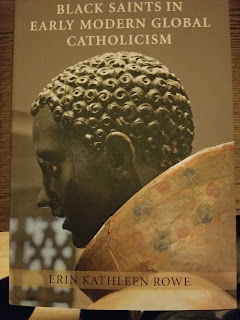Recently, your humble blogger became aware of Erin Kathleen Rowe's
Black Saints in Early Modern Catholicism through a social media post. It was intriguing in that as someone who is Black and Catholic, it isn't common to see discussion of Black people, including saints who were Black, in light of the history of the universal Church. Thankfully, there are strides being made to change that, including Professor Shannen Dee Williams' #BlackHistoryisCatholicHistory work and Dr. Tia Noelle Pratt's Black Catholic Syllabus. If memory serves correctly, the aforementioned social media post was a response to Professor Williams ' commentary. All in all, it was serendipitous that this led to reading Rowe's tome.
Black Saints deftly explores the veneration of Black saints in the early modern period, from the 16th to 18th centuries. Through extensive research and analysis of images from religious sites in the Iberian peninsula that went long unstudied, Rowe illustrates how devotion to these holy figures, promulgated by enslaved Africans in the region at the time provided a different blueprint for looking at holiness, blackness, and cultural power. This blueprint, she demonstrates, had a impact on the societies where these devotions occurred and eventually made its way to the New World.
It goes without saying that the history of Catholicism is deep and rich- so much so, there is much that has gone undiscovered. This is especially true in terms of the history and traditions of Black people in the Church and their impact on the Church globally. For those interested in this part of Catholic history, Black Saints in Early Modern Catholicism and the work of Professor Williams and Dr. Pratt are definitely worthwhile engagements.


